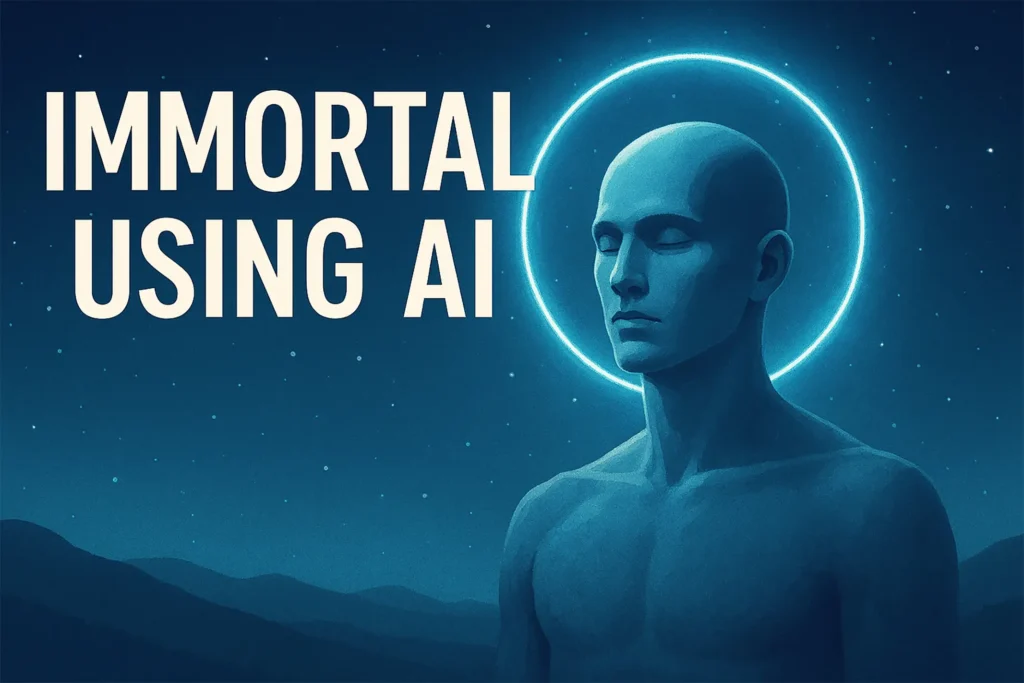The concept of digital immortality has fascinated humanity for decades, blending science fiction dreams with cutting-edge advancements in artificial intelligence, neuroscience, and biotechnology. As AI systems evolve to understand, replicate, and even predict human behaviour, the question arises: Could AI preserve our minds and personalities beyond our biological lifespan? In this comprehensive exploration, we examine the science, ethics, and future of AI-powered eternal life.
Understanding Digital Immortality
Digital immortality is the concept of preserving a person’s consciousness, memories, and personality in a digital form—allowing them to “live” indefinitely through artificial intelligence. Instead of relying on the human body, this idea focuses on transferring the mind into data that can exist in virtual environments, intelligent avatars, or even robotic hosts. Advances in AI, brain-computer interfaces, and neural mapping are bringing this once-science-fiction dream closer to reality.
How AI Could Preserve the Human Mind
AI plays a pivotal role in mapping, storing, and simulating the human mind. The process involves several advanced technologies:
1. Brain Mapping and Neural Scanning:
To digitally preserve consciousness, scientists must fully map the brain’s neural connections. Techniques like MRI, high-resolution electron microscopy, and neural decoding algorithms allow researchers to capture the structure and function of individual neurons and synapses.
2. Mind Uploading:
In the mind uploading process, a person’s brain data is transferred to a digital medium, where it can be simulated by AI. This requires massive computing power and advanced algorithms capable of replicating neural network activity on a digital platform.
3. AI-Driven Personality Emulation:
AI can be trained using personal data — conversations, writings, preferences, memories — to create a digital avatar that behaves and responds like the person it represents. Large language models and generative AI systems can simulate realistic conversation patterns, emotional responses, and decision-making styles.
Current Technologies Paving the Way
1. Neuralink and Brain-Computer Interfaces (BCIs):
Elon Musk’s Neuralink and similar projects aim to merge the human brain with AI systems. These BCIs could eventually record a person’s thoughts, upload memories, and even allow two-way communication between biological and digital minds.
2. Project ETER9 and AI Social Media Avatars:
Platforms like ETER9 create AI versions of users that continue interacting on social media after their death, learning from their previous posts and interactions.
3. Digital Afterlife Startups:
Companies such as HereAfter AI, Replika, and Eternime specialise in memory preservation and personality replication, allowing loved ones to interact with AI-powered versions of deceased individuals.
The Science Behind Consciousness Replication
To achieve digital immortality, AI must go beyond simple data storage. It must understand qualia — the subjective experience of being — and simulate consciousness itself. Researchers debate whether true consciousness can be replicated or if AI will only ever mimic its outward behaviour.
Key challenges include:
- Complexity of the human brain:
With over 86 billion neurons and trillions of connections, the brain’s full functioning is still not completely understood.
- Subjective experience problem:
Even if AI perfectly replicates responses, does it feel or just simulate?
- Data completeness:
Capturing every nuance of personality requires an enormous amount of detailed personal history.
Potential Benefits of Digital Immortality
- Preservation of Knowledge:
Great thinkers, scientists, and innovators could continue contributing to society indefinitely.
- Emotional Comfort :
Families could still interact with digital versions of lost loved ones.
- Educational Legacy:
AI versions of historical figures could teach future generations with personalised engagement.
- Medical Research:
Understanding and replicating human cognition could lead to breakthroughs in treating neurological diseases.
Religious Perspectives on AI and Eternal Life
Religious views on digital immortality vary:
- Christianity often frames eternal life in spiritual, not technological, terms. Some see AI immortality as overstepping divine boundaries.
- Buddhism questions whether clinging to a digital self conflicts with the belief in impermanence.
- Transhumanist philosophy, on the other hand, embraces the fusion of man and machine as the next step in human evolution.
The Road Ahead: From Fiction to Reality
AI-driven digital immortality is no longer pure science fiction. With advancements in quantum computing, neural imaging, and generative AI, scientists may reach a point where a person’s mind can be preserved indefinitely in a digital environment.
However, true immortality requires solving deep neuroscientific mysteries and addressing ethical frameworks to ensure that such technology benefits humanity rather than exploits it.
The next decade could see AI avatars becoming increasingly indistinguishable from their human counterparts, leading to a world where death, as we know it, may be redefined.
Final Thoughts:-
The dream of living forever through AI sits at the intersection of technology, philosophy, and ethics. While we may be far from fully uploading our consciousness, every new development in neuroscience, machine learning, and bio-digital integration brings us closer to this once unimaginable possibility.
Whether digital immortality becomes a miracle of human ingenuity or a moral Pandora’s box depends on how responsibly we develop and deploy these technologies.

